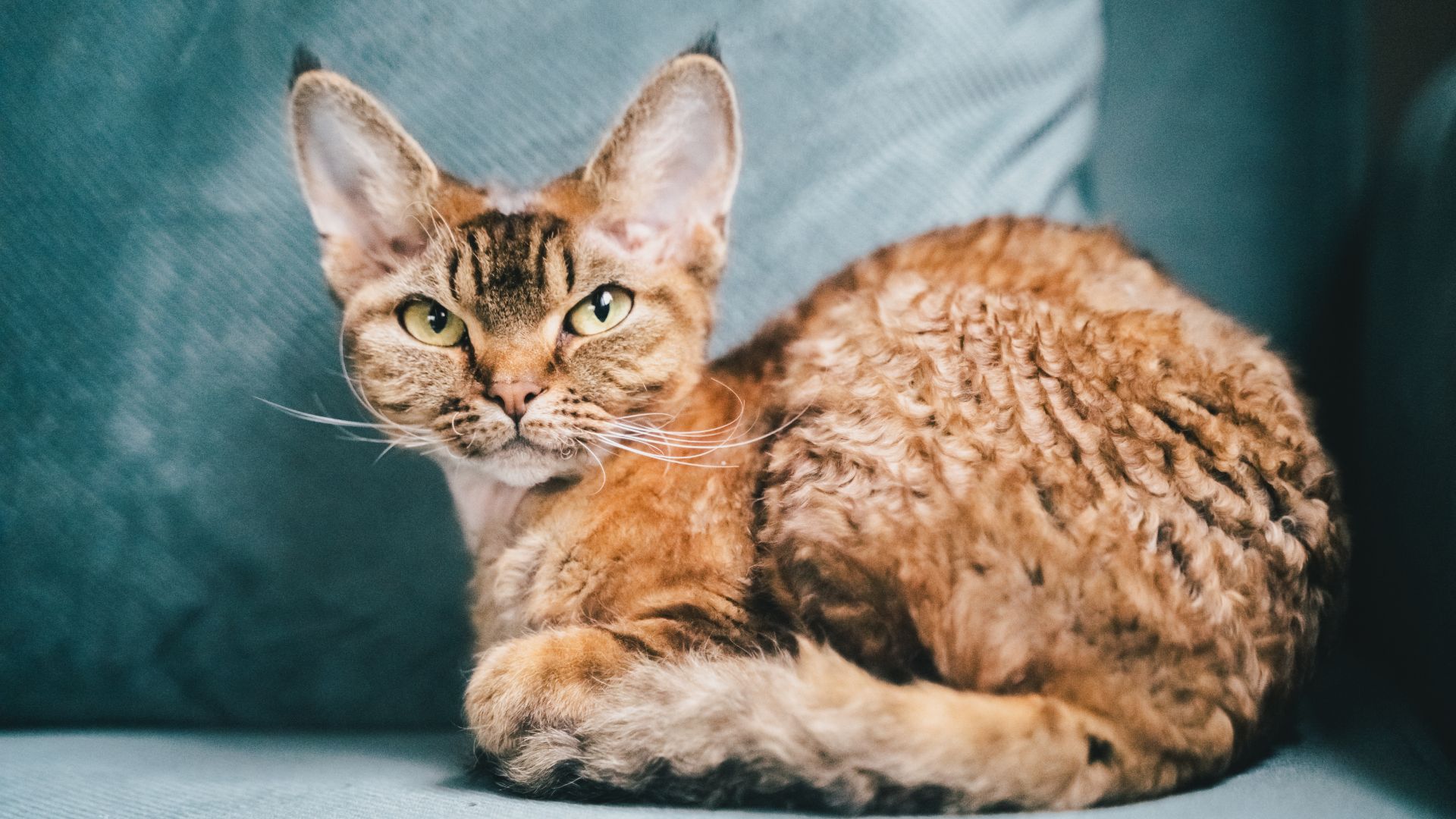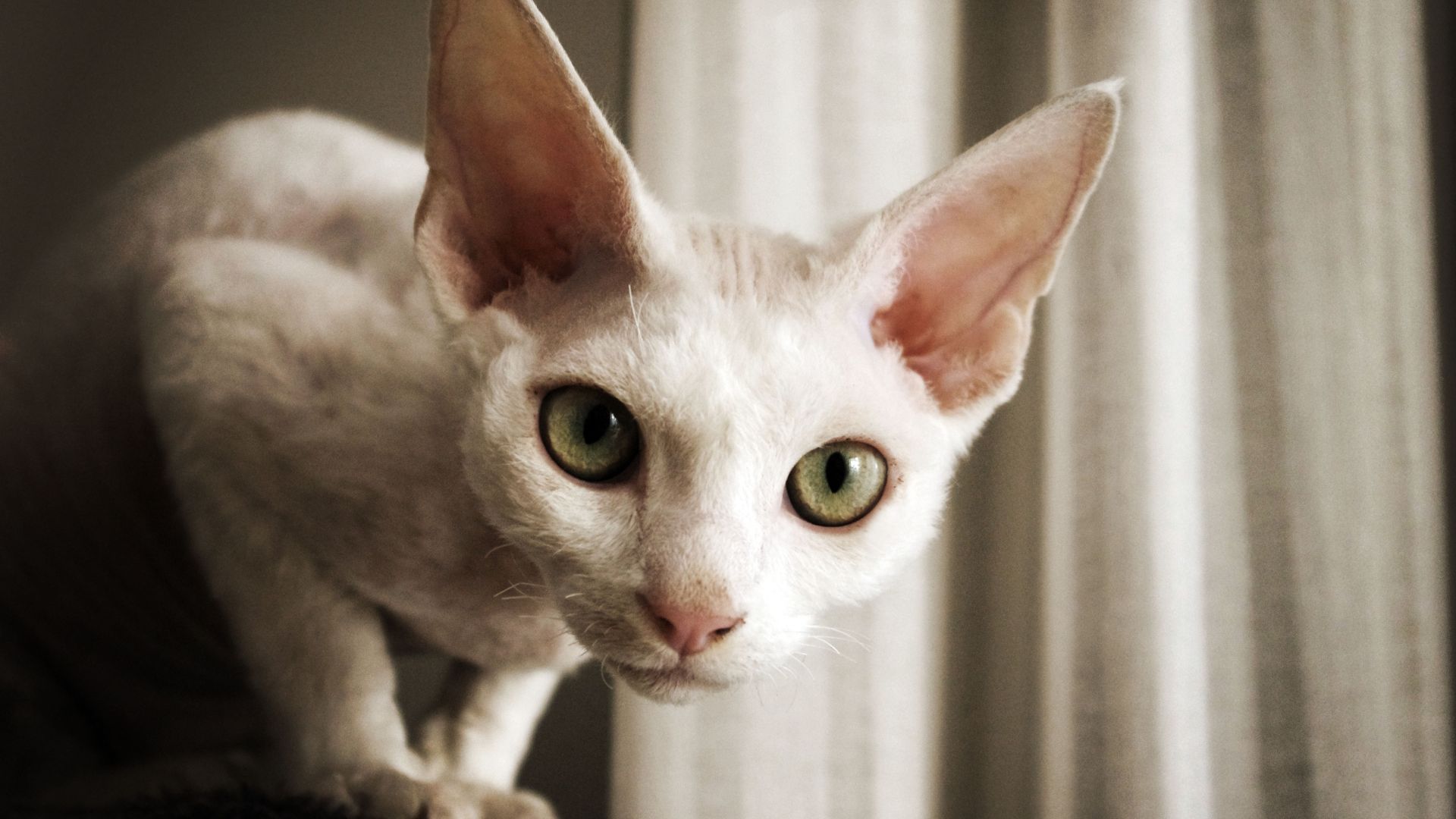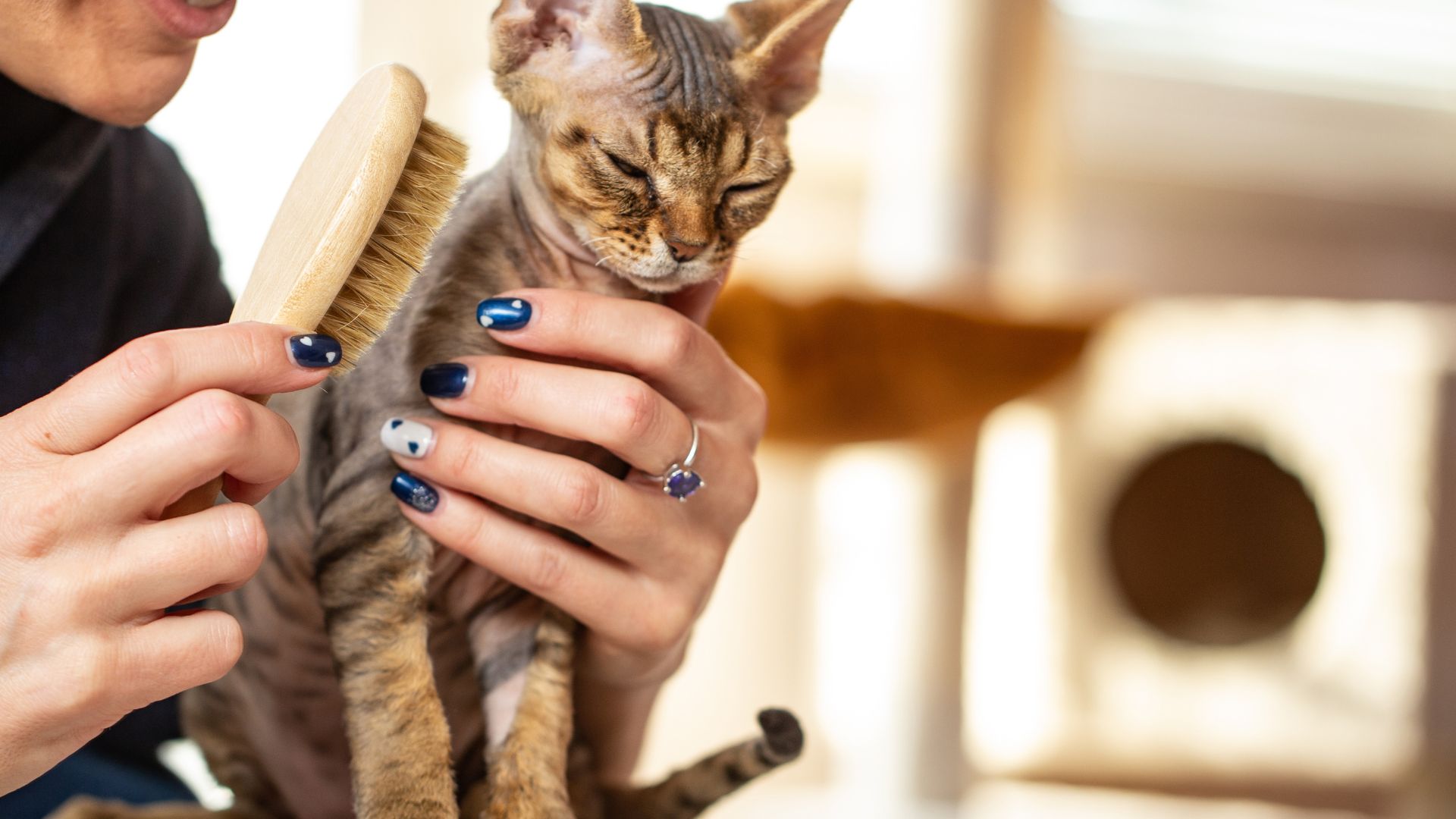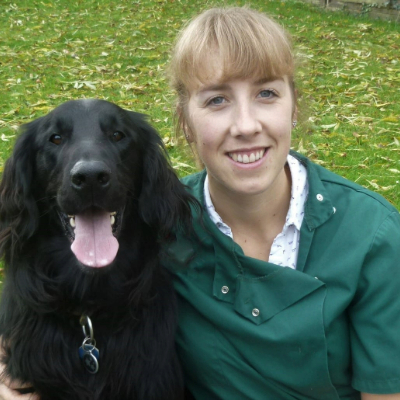Devon Rex cats are the curly-coated, elfish-looking breed that will thrive in human company
The unique-looking Devon Rex could be the perfect companion for active homes

Get the best advice, tips and top tech for your beloved Pets
You are now subscribed
Your newsletter sign-up was successful

Other names: pixie cat, poodle cat, Alien cat
Life expectancy: 12–16 years
Size: 6–9 lbs in weight and 15–18 inches in length
Coat (colour and pattern): solid colors, like black, white, gray, brown, red and cream. Tabby, calico and tortoiseshell patterns.
Eye colour: amber, blue, copper, green, gold, hazel and yellow
Temperament: playful, active, social and a lover of human companionship
Origin/native country: Devon, England
The Devon Rex is one of the friendliest cat breeds around. Wide-eyed with excitement most of the time, these kitties, which are often called pixie cats, due to their short nose, mesmerizing eyes, triangular-shaped ears and wedge-shaped face, are an extremely playful breed.
When they’re not scaling your furniture, they’re probably following you around. And when they’re not being mischievous, they’re most likely playing fetch.
Originating in Devon, England, in the late 1950s and officially recognized as a breed in 1983, this wavy-haired breed owes its origin to one cat called Kirlee. Thanks to a genetic mutation, the kitten was born with a curly coat – hence it's name – elfish ears and a slender face. It’s these differences that meant the Devon Rex differed from the Cornish Rex. To discover everything there is to know about this enchanting and rare breed of cat, keep scrolling.
Are Devon Rex cats hypoallergenic?
Yes, just like a Bombay cat, Abyssinian, Balinese and Cornish Rex, a Devon Rex cat is considered to be hypoallergenic when compared to other breeds, thanks to its unusual, short-medium length curly coat.
“This cat is a low shedder, meaning you won’t find too much hair and dander around your home," Dr Rebecca MacMillan explains.
However, their coat will still contain the Fel d 1 protein.
“This protein is spread from the saliva across the coat during grooming," explains Dr MacMillan. "So, if you are sensitive, then this cat could still trigger your allergies.”
Get the best advice, tips and top tech for your beloved Pets
If you are allergic to cats, it’s worth knowing that no cat is completely allergen-free, as your allergies are not actually caused by a cat’s fur but from the Fel D1 protein. Therefore, while there is technically no such thing as a hypoallergenic cat, some breeds are considered to be hypoallergenic because they have less of the allergen protein or don’t shed as much.
Are Devon Rex cats friendly?
They really are!
“Every Devon Rex I have met has been sweet-natured,” Dr MacMillan says. More often than not, these friendly cats are described as playful and thrive in human company.
“Their sociable nature makes them a good choice for a family home, as they usually get on well with children,” the vet explains. “More people around also means more attention for the Devon Rex and they will love entertaining everyone with their antics!”.
So, if you are considering adopting a Devon Rex, it’s worth investing in some of the best toys for indoor cats and the best automated cat toys.
How do you groom a Devon Rex?
The answer to this is very carefully! While most cats will require weekly brushing with one of the best cat brushes, Devon Rexes have delicate wavy or curly coats that require minimal grooming, as over-grooming can cause bald patches. Instead, it's best to gently wipe them with a damp cloth.
Plus, due to their larger-than-average ears, they need regular ear cleaning to prevent the buildup of infection and debris.

How much exercise do Devon Rex cats need?
A Devon Rex is considered to be a high-energy cat breed that will love nothing more than expending its seemingly never-ending bank of energy.
Along with climbing your furniture and exploring places from way up high, these inquisitive cats love to clown around. And it’s their inquisitive and playful nature that means these cats are very active.
Therefore, Dr MacMillan notes: “The Devon rex needs plenty of exercise and stimulation, which will continue well into later life. These cats are also excellent climbers and jumpers, so make sure you provide them with plenty of cat furniture and perches to play on.”
Training might not be the first thing that comes to mind when it comes to a cat. But Devon Rexes are also reasonably trainable, so you could try a few training exercises like ‘fetch’ to keep their brains busy.
Wisdom Panel Cat DNA Test | Amazon
Not sure exactly what breed your cat is? This kit screens for 70+ breeds, 45 genetic health insights and 25+ physical traits – because knowing every detail about your cat helps you understand how best to care for them.
Are Devon rex cats healthy?
Like all pedigree cats, the Devon Rex is prone to a few health complaints. According to Dr MacMillan, this includes hypertrophic cardiomyopathy (HCM), which is a hereditary condition that causes thickening of the heart muscle.
“This stops the heart from working effectively and could lead to heart failure in severe cases,” Dr MacMillan explains. To avoid this from happening, Dr MacMillan suggests choosing a breeder that doesn’t have HCM in their breeding lines, to increase the chances of having a healthy cat.
Myopathy, which is an inherited disease causing muscle weakness, can be another health condition to watch out for.
“Affected cats typically start showing problems between three weeks and six months of age,” Dr MacMillan says. “If the symptoms become severe, this problem could be fatal. However, there is a genetic test available, so a reputable breeder will have tested their cats before breeding from them.”
Devon Rexes are also prone to a blood-clotting disorder, which can lead to bleeding problems, the vet tells us.
“This hereditary vitamin K-responsive coagulopathy can’t be cured but may be managed through vitamin K supplementation,” Dr MacMillan says.
The Devon Rex is also susceptible to hip dysplasia, which is a condition where the hip joint doesn’t develop properly.
“This can lead to painful lameness,” the expert notes. “Patella luxation also affects these cats, causing the kneecap to slide out of its normal position.”
To help keep your Devon Rex as happy and healthy as can be, it’s crucial to purchase your kitten from a reputable breeder, who has carried out all the recommended health testing.
“Regular vet checks will also help to spot any developing problems sooner in your cat,” Dr MacMillan says. “You must also make sure that you provide your Devon Rex with all the recommended preventive care, such as neutering, vaccinations, and anti-parasite treatment."
A good quality complete diet, complete with the best cat food is also essential, making sure that you keep your pet at a healthy body weight. "Obesity could make issues like heart or joint disease much worse," Dr MacMillan adds.
How much does a Devon Rex cost?
Costing up to $3,000, these eternally playful pedigrees are considered to be one of the most expensive cat breeds. However, just like with any other feline friends, location and breeder will have an impact on the cost.
Devon Rex cats are often expensive due to a variety of factors, including their health concerns, specialized breeding process and their rarity.
If you are looking for a similar kitty at a more affordable price, a Cornish Rex kitten typically ranges from $800 to $1,500.
Should I get a Devon Rex?
Hugely playful and coming with bundles of energy, this breed adores making friends, so is brilliant for busy homes that see a lot of visitors. The Devon Rex will also thrive in spaces where there is plenty of cat trees or furniture to climb and will adore time spent in the company of others.
While the Devon Rex can be prone to a few health issues, like hypertrophic cardiomyopathy and myopathy, this can be prevented if you choose a reputable breeder that doesn’t have these traits in their breeding line.
Above all, a Devon Rex loves spending time with its human parents. So if you have lots of love to share and plenty of time to devote to this feline friend, a Devon Rex will feel right at home.
Taking Care Of A Devon Rex Cat | Amazon
The third book in the Devon Rex trilogy, it tells you all you need to know about general caring, grooming, nutrition, and common disorders of Devon Rex Cats
Read next: Facts about Devon Rex cats

Having graduated in 2009 from the Royal Veterinary College in London as a veterinary surgeon, Rebecca is highly experienced in first opinion small animal practice, having done a mixture of day-to-day routine work, on-call emergency duties and managerial roles over the years. Rebecca recently achieved a BSAVA postgraduate certificate in small animal medicine (with commendation).
Rebecca writes on various feline and canine topics, including behavior, nutrition, and health. Outside of work and writing she enjoys walking her own dog, spending time with her young family and baking!
Edited by Georgia Guerin.
This feature was last updated in May 2025 by Becks Shephard.

Becks Shepherd is a lifestyle journalist who has worked with titles such as Tom's Guide, Marie Claire, and Fit and Well.
In addition to this, she’s a pet writer with nearly a decade of editorial experience across digital and print media. A devoted “dog aunt” and lifelong animal lover, Becks brings a personal touch to her pet content—whether she’s testing the latest dog gear or digging into behavioral tips.
She works closely with veterinary experts to ensure factual accuracy and is currently exploring animal care certifications to deepen her knowledge. Her work has appeared in leading outlets across health, wellness, and pet care spaces.


